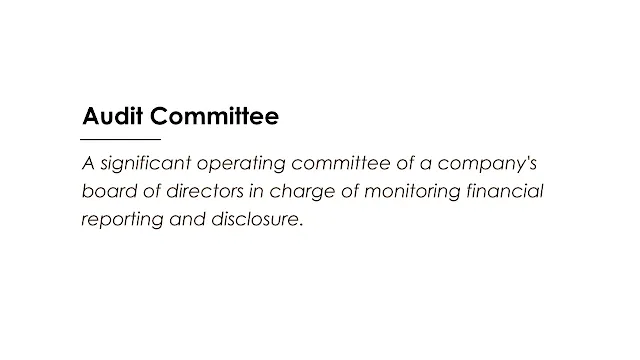 |
| Image: Moneybestpal.com |
Audit committees are crucial for assuring the accuracy, completeness, and high standards of financial reporting and disclosure in a company.
They are essential in managing the internal and external audit procedures and ensuring that rules and regulations are being followed.
Definition of Audit Committee
An audit committee is a significant operating committee of a company's board of directors in charge of monitoring financial reporting and disclosure. In order to keep an eye on the accuracy and dependability of the financial statements, the efficiency of the internal controls, the independence and performance of the auditors, and the prevention and detection of fraud, the audit committee collaborates closely with the management team, the internal auditors, and the independent auditor.
Regulations of the Audit Committee
The Securities and Exchange Commission (SEC) required numerous standards for audit committees of publicly traded corporations in the US with the Sarbanes-Oxley Act of 2002 (SOX). These requirements include:
- The audit committee must have independent members, who are not connected to the business or its management and who are not paid by the enterprise other than for their board duty.
- A minimum of one financial expert, or someone with accounting or financial management training or experience, must be a member of the audit committee.
- The independent auditor must be appointed, compensated, and supervised by the audit committee, and any disputes between the auditor and management must be settled by the committee.
- To prevent any conflicts of interest, the audit committee must first authorize any non-audit services rendered by the independent auditor.
- Procedures for receiving and processing complaints about accounting, internal controls, or auditing issues, as well as safeguards against retaliation for whistleblowers, must be established by the audit committee.
- The board of directors must receive regular reports from the audit committee outlining its findings and activities.
Responsibilities of the Audit Committee
The audit committee has a wide range of responsibilities that cover various aspects of financial reporting and auditing. Some of the main responsibilities are :
- Examining the quarterly and annual financial accounts before they are made public and confirming that they adhere to all applicable laws, rules, and accounting standards.
- Any important issues, judgments, estimates, risks, or uncertainties that could have an impact on the financial statements or the audit's overall quality should be discussed with the management team, the internal auditors, and the independent auditor.
- Assessing the efficacy and sufficiency of the internal controls over financial reporting and ensuring that any significant flaws or inadequacies are corrected as soon as possible.
- Evaluating the independence, credentials, and performance of the internal auditors and the independent auditor, as well as making sure they have access to the necessary tools, resources, and power to carry out their duties.
- Reviewing the audit plans, scope, methods, and findings of the internal auditors and the outside auditor and making sure that they work together to avoid overlap or gaps in their work.
- Maintaining a close eye on how accounting rules and regulations are being put into practice and keeping an eye out for any adjustments or novel developments that could have an effect on the financial reports or disclosures.
- Monitoring the organization's risk management strategies and procedures to make sure they adhere to its strategy, goals, and risk appetite.
- Fostering a culture of ethics, honesty, and responsibility within the company and advocating for a forceful tone from the board and management at the top.
Best Practices of Audit Committee
An audit committee should adhere to a few best practices that might improve its performance and value in order to carry out its duties successfully. Some of these best practices are :
- Maintaining a clear charter that outlines its mission, scope, membership, structure, duties, and obligations.
- Holding regular meetings with a defined agenda that covers all essential subjects and enables ample time for debate and decision-making.
- Communicating often and honestly with all parties involved, such as the board, the management, the internal and external auditors, the regulators, and the shareholders.
- Requesting outside guidance or help when necessary to handle sophisticated or technical challenges or to get a different viewpoint.
- Evaluating oneself or others on a regular basis to find areas for development.
Conclusion
An audit committee is a crucial part of corporate governance that protects the integrity and caliber of an organization's financial reporting and auditing. An audit committee can benefit the stakeholders in the business and help it succeed over the long run by adhering to legislation, carrying out its duties, and adopting best practices.
